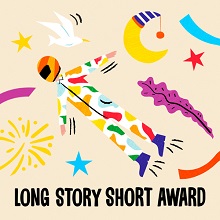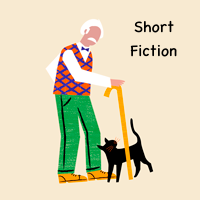Bobby didn't talk much in class. When he did speak, the other children often made fun of him because he stammered. His words just wouldn't come out right. They twisted around his tongue like slimy ... [+]
He turned to her with bruised eyes and a trembling smile, “What kind of life demands nothing from its people but existence? How apathetic a world we’ve been subjected to, a world that left freedom and choice to a population as cruel as our own. It must be suicidal, to give decision to a disease as untreatable as we are.”
He breathed in the stained air.
“Now it’s dying. Now it is burning and melting and tearing itself apart at the seams, and we are left to witness its last breaths.”
The girl smiled sadly at the shaking boy. “You’re tired, bud. Let’s get back to the lab.”
They hobbled off the cliff top from which an electric city could be seen glowing over the thick tree line. Its humming filled the night air as if censoring silence, coughing quiet, gentle plumes from the tops of its tall towers. They walked slowly, as if they were happy the sight didn’t touch their vision the way back.
Stepping into the silent forest, their destination stood dim in the low-light ahead. Their shed was modest, about the size of a child’s bedroom, and set crooked beside a green, hypoxic lake. The stench of rotting fish remained masked by plastic from a garbage pile, sitting innocently a few metres from the waterline. Weaving their way through the trees they pried open the broken wood door.
The lab always smelt of coffee. One would think with the amount of chemical-stained machinery pulsing upon every space of that flickering room, it would smell pungent - acidic from the antiseptic and with a tinge of rust, as most labs do - but it didn’t. It smelt of coffee. It smelt human, more so than the city did.
The boy stood in the doorway, taking in the sight as if he did not see it everyday, before a flicker seemed to light behind his eyes, and suddenly he was on autopilot - coming alive like a machine plugged in to charge. The girl moved in a similar fashion towards her own side of the room - a desk stained with chemicals upon which various pieces of equipment lay, plants and molds sprouting from every container and connected to breathing bottles by thin, pulsing tubes, like patients in a hospital.
“Has Phillip delivered the treatment yet?” the girl asked, not expecting an immediate response.
A minute later the boy swiveled to face her with a loud squeak of his chair. “He should be back with the results right about-”
A small, spherical apparatus rolled through a rusty tube stationed at the base of a wall and into the boy’s ankle with enough force to bruise. The boy winced as the girl giggled with glee. “The motors were built on budget, okay?” the boy huffed with a warm grimace. “He’s got one of my first E.S.C.’s stuck in him, and it’s not even hooked up right.”
The girl merely laughed harder. “You’re not doing too much to help your case, bud,” she managed between breaths.
The boy picked up the small steel ball with care and smiled at it fondly. “Hello Phillip, you’ve done a good job today. You can rest now,” the boy muttered affectionately. The little machine chirped in response before the blue glow peeking through its seams slowly faded to grey. The boy picked up his screwdriver and got to work.
As the last drop of natural light faded away and the distant humming of a churning city seemed to dim, the girl turned to the boy with tired eyes. “I think I’m going to pack up for today, bud.” She spoke softly despite their solitude. “I’m guessing you wanna stay here tonight?” The boy nodded. She knew she could not convince him otherwise - the work was too important. “Be careful then, will you?”
The boy smiled hollowly. “There are no more creatures to be afraid of in these woods,” he whispered.
The girl smiled back. “I meant more along the lines of, “don’t short that brain of yours.” Do try to get some shut eye, won’t you?”
The boy’s hollow smile softened into something more honest, albeit sadder, “Sleep for the both of us,” he managed. With that, the boy was left alone.
He turned to Phillip, who lay in parts upon the rotting work table, and resumed work on his motor. “I can feel it, you know,” the boy mused to the pieces in front of him. “When the feeling comes back.” He slowly unwound a wire. “I can feel the clarity in my mind.”
“I don’t know if this is worth anything. I don’t know if what I built you for means anything.” The boy finished unwinding the last coil, leaving the metal bare and unusually vulnerable. “But now and then I feel this clarity, this sharpness, as if I’m coming up for air.” The boy paused, smiling weakly, reaching for a fresh wire roll.
“It’s selfish - arrogant - this clarity, this hope. As if there’s an idea floating around a head as small as mine that could do something. An idea I could bring to life to fix something, to make a difference, to bring sense.” The boy looked up and through the window in front of him, where he could just make out the bioluminescent glow of the treated fungi, sprouting in stark contrast to the dead lake beside them. He sat, quiet and deep in thought for a stretch of time, before abruptly standing up.
“Coffee,” he seemingly agreed.
A crisp scent filled the air, promising him a sleepless, but productive, night. He took a sip, and for a second the acidic warmth was all he knew. For him, that was more than enough.
The morning came with boisterous showers, a kindly breeze, and moody skies he grinned at as he left the shed, pulling the tarp of woven shopping bags over the roof before he set off for school.
It was almost funny how human the rain made people look. With shiny ponchos and plastic umbrellas, it almost seemed as though anyone without some sort of protection would melt at contact with the liquid. They wore their plastic like doctors do masks or knights did armor, only instead of sickness or pain, they wore their protection against a harmless, essential cold, against something inherently part of them. Somehow, it made sense.
Stepping foot into a dull, white building, he made his way to class in wet clothes. He spent the time staring at the clock, occasionally mistaking the murmuring of his classmates for the humming of machines as he blinked away sleep. By the time he blinked again, the hour hand had jumped forwards, and a figure stood in front of him with a fresh blueberry muffin and steaming coffee in a thermos. “Hey bud, thought you might need this,” she offered knowingly. The boy responded with a warm, sleepy grin and a soft “thank you” as he accepted the meal.
He took a bite of the muffin and a sip of the coffee, looking at them with an unwarranted amount of gratitude. To him, they were more than enough.
As the final bell signalled the end of the school day, the boy trudged through muddy puddles the morning showers left behind and towards the crooked shed. The girl walked humbly behind him, joking about her wet shoes. As the shed came into view, her jovial tone slowly fell away as she questioned the boy from behind him. “Today’s the last day, right?” She could see the boy nod, and although she could not see his face, she recognized the slight quiver to his breath. She recognized the same in her own.
They pushed open the wooden door, hesitating only a second before getting to work.



